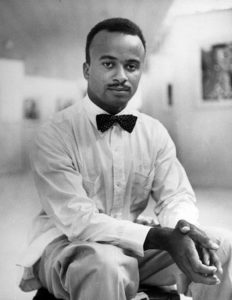
The Night Letter (1938)Eldzier Cortor
*Eldzier Cortor was born on this date in 1916. He was a Black artist.
He was born in Richmond, VA, to John and Ophelia Cortor, who were economically secure. His family moved to Chicago when he was about a year old. After a few years, they moved to the West Side, where Archibald Motley’s family lived. Cortor’s earliest influence in art was comic strips. His favorite was "Bungleton Green," created by Leslie Rogers. He would copy them and dream of creating his own.
The Great Depression forced the Cortor family to move to the South Side, where he enrolled at Englewood High School. In the school’s poster shop, he worked with fellow "soon-to-be" artists Charles Sebree and Charles White. His father shunned his interest in art, and Cortor was forced to drop out of school to work. In 1936, he continued to take evening drawing classes at the Art Institute of Chicago. In 1940, he worked with the Works Progress Administration (WPA) in Chicago and eventually studied in Sea Islands, Georgia, on a Rosenwald Fellowship in 1944 and 1945.
In 1949, Cortor also studied in Jamaica, Cuba, and Haiti on Guggenheim Fellowship. From 1949-1951, he was a teacher at the Centre d'Art, Port-au-Prince, Haiti. His major exhibitions include Three Masters: Eldzier Hughie Lee-Smith, Archibald John Motley, Jr., Kenkeleba Gallery, New York, 1988. One of the first Black artists to make Black women his major theme, Eldzier Cortor found his niche in printmaking.
Calling himself a "group painter" because he felt his life experiences were those of any Blacks he sought to reflect them in his paintings. Eldzier Cortor died on November 26, 2015
The St. James Guide to Black Artist
Edited by Thomas Riggs
Copyright 1997, St. James Press, Detroit, MI
ISBN 1-55862-220-9